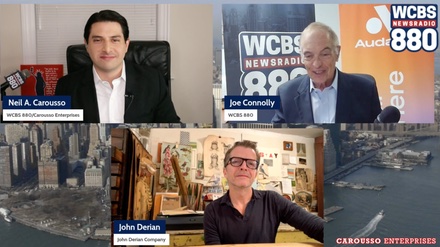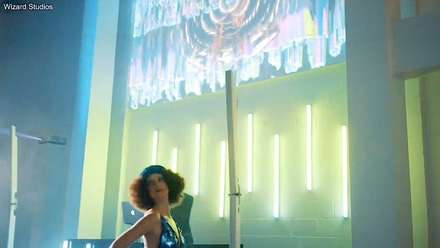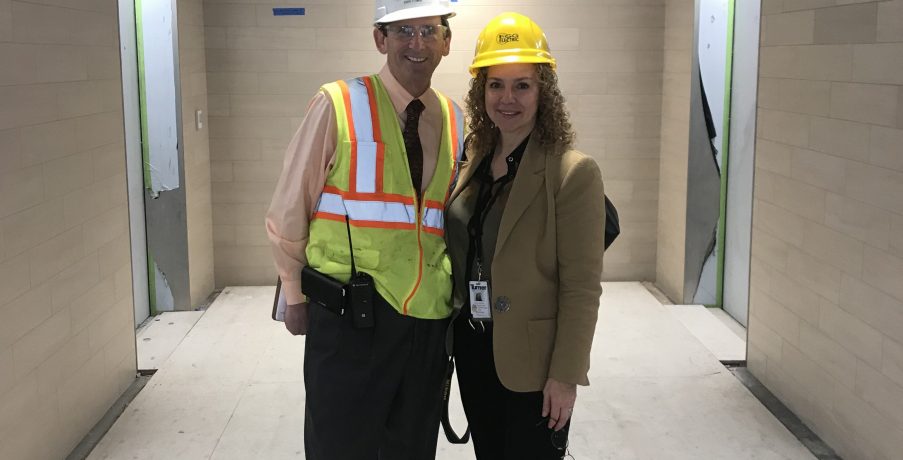
The Latest

The Multi-Tiered Approach to Gaining Exposure and Credibility. Become a Repeat Source for the Media

Husband Sent Flirty Texts before Mica Miller’s Death, Waitress Says

Kristi Noem on Retraction: Kim Jong Un ‘Should Not be in the Book’

Kevin O’Leary: AI bossware can ID protesters and bar them from jobs

Neil A. Carousso Joins Growing NewsNation Network

Neil A. Carousso Departing WCBS 880

Art Business Founded by Former Foster Child Speaks to the Human Experience

1010 WINS Small Business $10K Challenge: Small Business Owners Make their Pitch for $10,000

NYC’s Élan Flowers Evolves into Blooming Subscription and Corporate Services

Creating an Authentic Retail Experience Online
-
3 Things Your CEO Must Do To Advance Mental Wellness In The Workplace
Post Views: 515CEOs are beginning to recognize the importance of advancing mental wellness at work, especially as talent remains a top concern. Here are the things a CEO must do to advance mental wellness according to a top sports psychologist.
By Ana Reed, Founder & CEO of Newmanity, Inc
Produced and edited by Neil A. Carousso, Founder, President & Owner of Carousso Enterprises, LLC.
As seen in

CEOs are beginning to recognize the importance of advancing mental wellness at work, especially as talent remains a top concern over the coming years.
I spoke to Dr Corey Yeager who is the Psychotherapist for the Detroit Pistons and who has worked with different influential organizations including the Oprah Winfrey Company.
Dr Yeager speaks openly about how executives and organizations still have a way to go when it comes to normalizing mental wellness. When it comes to physical wellness, we have seen far greater advancement. Generally people in organizations are free and comfortable to discuss their physical health, however mental wellness still carries a stigma, and we are not quite there yet with appreciating and normalizing the importance of mental wellness.
There are many things organizations can do to advance mental wellness. Here are some of the top tips as discussed with Dr Corey Yeager.
Hire qualified therapeutic practitioners and promote psychoeducation.
Many companies are focused on strategic initiatives that will promote overall well being, but often still miss the mark on mental health. The simple fact is that mental wellness cannot effectively advance without the help of qualified therapeutic practitioners.
Many organizations are set up with external coaches, consultants and Employee Assistance Programs to help their employees, but are not yet focused enough on holistic therapeutic and strategic intervention. As Dr Yeager mentions, “therapeutic staff are needed within corporations, just as they are now used in sports teams”.
By providing psychoeducation through the use of qualified practitioners, CEOs and their companies can really advance the agenda of mental wellness at work, set an example for other companies and inturn, benefit from the results of increased performance and productivity.
Know how the “treatment” and “healing” of mental health can impact culture
For many companies, healing is an essential part of building a healthy culture. A culture of healing will offer people a safe space to improve their mental wellness and hence improve the overall wellbeing and productivity of a workforce.
Dr Yeager makes an important distinction for CEOs and organizations to understand. That there is a difference between the “treatment” and “healing” of mental health. He says that “healing is an inner process and can only occur within the individual, team and organization once the problems have been identified and correctly treated”.
CEOs and organizations that better equip themselves to effectively treat the problems of mental health will in turn facilitate greater healing, which will benefit the culture in the long term.
Empower the next generation as they will demand better equity and care across mental wellness
Dr Yeager speaks about the next generation of leaders, and it is them who will advance the mental wellness space, and demand greater access and transparency when it comes to solutions for mental wellness. Companies will be forced by the next generation to offer more personal and digital intervention, so it is up to them to be prepared for this change. Leaders in companies can start now by better understanding the needs of this generation, and what their likely impact will be.
There is a new normal for mental wellness that is evolving in the workplace. Some organizations are embracing this change, while others are far from normalizing mental wellness. CEOs can start by promoting psycho education, hiring the right therapeutic professionals, focusing on improving their culture through mental wellness and preparing for the next generation of talent.
To learn more about how you can improve your mental wellness as a leader, you can purchase Dr Corey Yeager’s new book How Am I Doing? 40 Conversations To Have With Yourself.
Ana Reed is the CEO and Founder of Newmanity, a global executive coaching and leadership consultancy. Ana is an award winning entrepreneur, thought leader, Forbes Council Member and ICF, PCC Accredited Coach. Using a transformative human-centered methodology, her company Newmanity enables leaders and organizations to realize their full ambition and maximize their human capital. Together with New York City-based production company Carousso Enterprises, LLC., which is owned and operated by award-winning journalist Neil A. Carousso, Ana is engaged in creating content around leadership, human performance and CEO best practice. To receive insider access to Newmanity’s exclusive content, email hello@newmanity.co.
-
Brooklyn’s Wizard Studios Sees Exponential Growth in Post-Pandemic Events Boom
Post Views: 423By Joe Connolly and Neil A. Carousso
BROOKLYN (WCBS 880) — Events and production company Wizard Studios has cashed in since events have returned with a vengeance since the COVID-19 pandemic eased.
“We experienced such incredible growth in ’22 over 2021,” said founder and CEO Matthew Saravay. “We were up over 115 percent, like well beyond what we had ever imagined we could handle as an organization.”
Saravay told the WCBS Small Business Spotlight, sponsored by Dime Community Bank, that they grew from a small and scrappy team to 50 full-time employees.
“We were predicting like 67 percent growth year-over-year because we knew we were coming out of a pandemic year into what we assumed would be a more normal pace of business. We didn’t expect the insane amount of demand for the services that we provide to the extent, sir, that we were turning away business because we couldn’t rightfully take on more opportunities and potentially mess up somebody’s event.”
The events in-demand right now include social gatherings such as weddings that were postponed during the pandemic. Corporate events and brand activations are also part of Wizard Studios’ bread and butter.
“Brands want to communicate and reach out directly to their affinity groups, to their customers. So, there’s been a tremendous ground swell around brands interacting face-to-face with their customers trying to win new customers,” said Saravay.
But, the company, which specializes in design and fabrications to enhance their experiences, does not grow by producing volume. Instead, Saravay learned early in the pandemic that he would prefer to create premium events at a higher rate for fewer clients.
“We had raised our average ticket price by about 40 percent,” he said. “We’re working hard to produce less events for higher average tickets.”

The lifelike fabrication of a subway car created by Wizard Studios. Photo credit Wizard Studios They got the attention of the MTA with a lifelike fabrication of a subway car for a non-profit organization that promotes equity in education by sending their tutors to neighborhoods where more disadvantaged students live.
“At their fundraiser, we created a subway car and the windows of the subway car were video screens and the doors worked,” explained Saravay. “We would start a video on the screens of a train moving out of a station, and then, it told the story of this nonprofit and how they were moving into the boroughs to serve the kids so they could spend more time with the academics and less time getting to and from the tutors.”
He said the MTA told him that Wizard Studios could probably make a subway car faster than them.
See Wizard Studios’ designs and production and get sales ideas on the WCBS Small Business Spotlight video above.
-
Despite Uncertainty and Tech Layoffs, City Small Businesses are Growing Again
Post Views: 431By Joe Connolly and Neil A. Carousso
NEW YORK (WCBS 880) — It appears small and midsize business owners are optimistic about their growth prospects for the rest of this year despite recession fears on Wall Street.
“They see more opportunities for growth, for bringing in revenue,” said Cory Schouten, editor-in-chief of Crain’s New York Business on the WCBS Small Business Spotlight, sponsored by Dime Community Bank.
“The catch there is that small and midsized businesses are seeing their costs increase, substantially, including their labor costs,” he added.
Crain’s recently surveyed the leaders of small and midsize businesses and found two-thirds of them expect their revenue to increase this year, but the same amount are seeing their costs rising. Half of those businesses expect to maintain staffing levels and, in fact, some report that they are hiring.
“A lot of companies are seeing this as an opportunity to go hire some tech talent that has been really impossible to hire, has been outside of their budget, but with some of the cutbacks in tech, other companies are snapping those people up,” said Schouten.
Some of those companies are raising capital and have even turned profitable.
Manhattan is an outlier in the city’s pandemic recovery, which has been more robust in the outer boroughs due to remote and hybrid work. Jobs have still not reached pre-pandemic levels.
“Office owners are updating their properties, so they’re very modern, they’re very adaptable for a flexible hybrid work environment. And, also, those owners of older office buildings in the city are looking at residential conversions,” Schouten said.
The Partnership for New York City reports office occupancy might remain at 56 percent for the foreseeable future, which is leaving the city with excess office space and few housing options until office buildings are converted. That continues to make Manhattan unaffordable for many employees.
“Right now there’s an office glut, but there’s not enough housing in the city. So, those two things can work together and kind of give us all a path forward,” said the Crain’s editor-in-chief.
Watch the WCBS Small Business Spotlight video above to see how local businesses are finding ways to grow.
You can read Crain’s New York Business’ economic outlook for 2023, available for free to WCBS 880 listeners, here.
-
Trailblazing Woman Breaks Down Barriers in Construction and Renewable Energy
Post Views: 647By Joe Connolly and Neil A. Carousso
NEW YORK (WCBS 880) — There are few women in construction, electricity and renewable energy. But, Ellen Aschendorf has broken down barriers in each of these industries.
Aschendorf started a construction-related business more than 30 years ago. Today, she’s on the leading edge again with her company Egg Electric, Inc., which specializes in commercial electricity and renewable energy projects.
“People didn’t just accept me,” Aschendorf said on the WCBS Small Business Spotlight, sponsored by Dime Community Bank.
Her mentality: “I was going to finish the job, do everything correctly, and give excellence.”
Aschendorf said her superior work spoke for itself and became the only sales apparatus she needed when men in her industry would hang up the phone after finding out a woman led her company. Egg Electric relies on referrals and repeat clients, including Facebook, NYU Langone Health and Hudson Yards.
“We did two buildings for the business school for Columbia University,” she said, continuing, “We’re working for mostly the big corporate world as in right now we have projects going on for Facebook at 50 Hudson Yards, for Amazon at 424 Fifth Avenue, we’re doing a DDC (Department of Design and Construction) garage project in Queens, which has the EV, we’re doing the hospital for a long client NYU Medical.”
Many of Aschendorf’s clients have been with Egg Electric for decades. In fact, one of their early clients was the New York Mets. Electricians from Egg Electric were present at every home game at Shea Stadium to operate the scoreboard in right field. Company electricians still work with the Mets at Citi Field.
The company started building cell phone towers in the 1980s.
“So we started doing, right from the beginning, different work. And traditionally people were either, you did hospitals, schools, commercial, residential. You did one of those, but I didn’t know any better. So I started going wherever the jobs were.”
That ability to be nimble allows Egg Electric to follow sales in a changing industry. Today, they’re one of the companies building New York City’s electric vehicle infrastructure.
“(DDC) had us put a tremendous amount of infrastructure for phase two, like putting in empty pipes for future EV charters. That tells me that the city is already thinking about the future and they were expecting this to increase more and more,” said Aschendorf.
Watch the WCBS Small Business Spotlight video above.
-
Top Business Leader Calls New York’s Post-Pandemic Economy an ‘Industrial Revolution’
Post Views: 531By Joe Connolly and Neil A. Carousso
NEW YORK (WCBS 880) — New York City office occupancy recently surpassed 50 percent for the first time since COVID-19 hit in 2020. That’s positive news for corporate executives, but it does not tell the full story of what’s happening in the city’s economy.
Kathryn Wylde leads the influential Partnership for New York City business group that represents corporations, including Goldman Sachs, Amazon and JP Morgan Chase & Co., and conducted that office survey. She told the WCBS Small Business Spotlight, sponsored by Dime Community Bank, that 82 percent of office workers are now enjoying a hybrid schedule.
“Prior to the pandemic, we’re talking about maybe 6 percent of the employers allowing people to work remotely,” said Wylde.
That’s the new normal or what the Partnership for New York City president and CEO labels a new “industrial revolution.”
“In the 70s, we had a dramatic experience of going from the old industrial economy to the service economy. Well, this is from the service economy to the digital economy. And instead of happening gradually over one or two decades, it happened instantaneously.”
Wylde noted entire industries have changed to be centered around technology.
“We have remote education, telemedicine, remote health, we’ve got remote work, remote entertainment, remote cultural experiences,” she said. “All of that has changed and I don’t think we know the implications yet.”
Wylde, like many traditional business leaders, believes strongly in in-person work, but she acknowledges Zoom has its place.
“We can fit more into our day when we can do Zoom instead of running to Midtown,” she said. “We just have to learn how to use that tool in a way that doesn’t interfere with building relationships and with the kind of mentoring and support and development that particularly young people need in their careers.”
Remote work has held back Manhattan’s recovery. The Partnership for New York City sees small and mid-size businesses in the outer boroughs and the suburbs growing at a record clip, but shrinking in Manhattan as rents remain near record highs.
“We have 32,000 new businesses formed in New York City in the last year. Manhattan’s the only one that didn’t have net growth in new businesses. Most of them are in Queens. Brooklyn is the number one. So, we’re seeing the city as a whole – its neighborhoods, its local business districts across the five boroughs and our surrounding suburbs – the economy’s pretty good,” said Wylde.
The main reason business groups see growth in the outer boroughs and the suburbs is that remote work has enabled people to shop in their communities during the week. Wylde said she is confident in Manhattan’s resurgence but it may take some time.
“The value of Midtown properties is going to spring back and it’s not going to be exactly the same as it was pre-pandemic. We’re going to see more residential, I think we know that, and that’s a good thing. It’ll make the streets safer on a 24/7 basis. It’ll bring back customers to local business.”
Watch the full conversation with Kathryn Wylde on the WCBS Small Business Spotlight video above.
Social Feeds

VIDEO: Told the airline to book us on the next flight out (SPONTANEOUS TRIP!)

VIDEO: The Taylor Swift Effect | WCBS Business Breakfast

VIDEO: Future of NYC | WCBS Business Breakfast

VIDEO: Reasons for New Yorkers to be Optimistic | WCBS Business Breakfast

VIDEO: NYC's AI Chatbot | WCBS Business Breakfast






